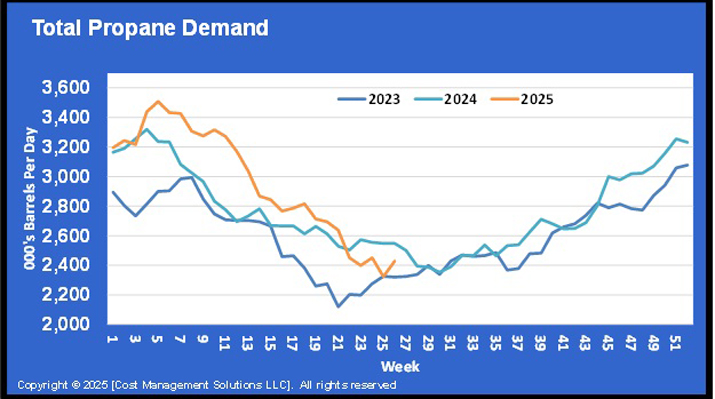Propane inventory, prices climb: Here’s why
For the week ending June 22, the U.S. Energy Information Administration (EIA) reported U.S. propane inventory at 58.365 million barrels, which is similar to the same inventory point at this time in 2017.

The above chart shows inventory was at the five-year low just four weeks ago, but strong builds erased the deficit to last year.
Despite the improvement in inventory position, propane prices are now in a sharp uptrend.

The sharp rise in crude prices – shown as the black line in the above chart – helped pull propane prices higher, but that is not the only reason for the gains in propane’s value.
The price spread between U.S. propane and overseas markets, or arbitrage, widened, meaning producers can get better netback for exporting U.S. propane.
Asian demand for U.S. propane is said to be extremely strong. In fact, one trader told us that every export dock slip is booked for the entire month of July. After months of exports below last year, July is shaping up to be a big rebound month.
The increase in crude’s price has been the key influence in elevating propane prices, but the increased interest in importing U.S. propane is making it easier for propane to keep up with the gains in crude’s price.
We are not sure if the potential for China to put tariffs on U.S. natural gas liquids imports is having an influence on the increased interest in U.S. propane. If that is a factor and tariffs are imposed, the interest in U.S. propane and the upward price pressure it is generating could quickly evaporate.
Fortunately, propane’s value to crude has not really increased, even with the heavy interest from overseas buyers. Mont Belvieu propane is trading at a low 53 percent of West Texas Intermediate (WTI) crude, and Conway is at only 43 percent.
If propane jumped in relative value to crude, it would make U.S. buys much riskier. Since that hasn’t been the case, buys remain a simple bet on the crude’s price trajectory.
The outlook for crude prices remains bullish. A poll of 34 crude analysts taken on June 29 shows WTI crude may average $66.60 this year. The price average for WTI has been $65.45. The new forecast was up last month, and is up more than $3.50 per barrel since February.
Many propane retailers are making defensive buys for winter protection based primarily on the outlook for crude. The idea is even if the propane export interest turns out to be short-lived, propane probably won’t drop far, if at all, from current price levels as long as crude stays elevated.
Still, the recent run in prices makes buys riskier. The best play may be to use financial swaps for price protection since those positions can be exited should the outlook for crude suddenly become more bearish.
For crude to become more bearish, traders will likely need to see that U.S. sanctions on Iran will not impact their export volumes, or Venezuela’s crude production would have to bounce back, which is highly unlikely.
Major gains in U.S. crude production will present a headwind for crude prices, but U.S. production has leveled off over the last three weeks, and U.S. producers aren’t employing many new rigs. U.S. producers had 862 rigs drilling for crude as of June 22, which is essentially the same as it has been for five weeks.
A retailer buying winter price protection in the U.S. needs to watch the headlines on crude very closely and be willing to exit positions if the outlook for crude turns sour. Concurrently, retailers need to watch propane export volumes. So far, exports haven’t shown up in the numbers reported by the EIA each week. Export activity in July and its resulting impact on U.S. inventory builds should be very interesting to monitor.
Call Cost Management Solutions today for more information about how Client Services can enhance your business at (888) 441-3338 or drop us an email at info@propanecost.com.
















